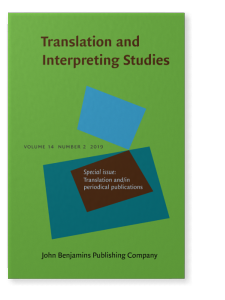 Ever since poking my nose in Nietzsche’s discovery of Dostoevsky (via French translation, as he disliked him in German translation), I’ve been keen to check to what extent he was under the spell of Dostoevsky’s French translators. That was easier said than done. It took me a couple of years to conceive and write the article “The psychologization of the Underground Man. Nietzsche’s image of Dostoevsky through the French translation L’esprit souterrain“, which now has been published in the journal Translation and Interpreting Studies (14:1).
Ever since poking my nose in Nietzsche’s discovery of Dostoevsky (via French translation, as he disliked him in German translation), I’ve been keen to check to what extent he was under the spell of Dostoevsky’s French translators. That was easier said than done. It took me a couple of years to conceive and write the article “The psychologization of the Underground Man. Nietzsche’s image of Dostoevsky through the French translation L’esprit souterrain“, which now has been published in the journal Translation and Interpreting Studies (14:1).
This the abstract:
After reading L’ esprit souterrain, the first French translation of Dostoevsky’s Notes from the Underground, Nietzsche embraced Dostoevsky as a master psychologist, notwithstanding their ideological differences. This article argues that the much-discussed influence of Dostoevsky on Nietzsche can be better understood by unraveling the specific nature of the translation L’ esprit souterrain. An analysis shows that as a consequence of the adopted translation strategy, the character of the Underground Man, who in the Russian context functions as a philosophical-ideological type, becomes a purely psychological type. This is all the more important, since Nietzsche’s enthusiasm for Dostoevsky led to rereadings of Dostoevsky through a Nietzschean lens.
Here’s the introduction:
At least with regard to their stance on the Christian faith, it is difficult to name two contemporary thinkers that are as philosophically distant from each other as Friedrich Nietzsche and Fyodor Dostoevsky. Around the same age that the Russian writer declared in a letter that “if someone proved […] that Christ is outside the truth, and that it were a fact that the truth excludes Christ,” he would “rather remain with Christ than with the truth” (quoted in Milosz 1975: 313), the philosopher with the hammer joyfully proclaimed in The Gay Science that God was dead. And still, all throughout the twentieth century and until today, both thinkers were seemingly self-evidently named in one and the same breath.
The prehistory of the mutual association of Nietzsche with Dostoevsky begins in the winter of 1886-1887, when the German philosopher, already in his forties and well-established, was staying in Nice. Perusing a bookshop, he caught sight of a work with the intriguing title L’esprit souterrain. Its author was a certain “Dostoïevsky,” whom the eloquent French critic Eugène-Melchior de Vogüé was currently catapulting into the center of the French literary debate (see Boulogne 2015). And yet, according to his own account, Nietzsche had not yet heard of him (see Stellino 2015: 23). As his many letters to friends testify, while reading L’esprit souterrain, Nietzsche promptly came under the spell of its proclaimed author, in whom he found “a bracing and incisive kindred spirit” (Love & Metzger 2016: xiv).
What Nietzsche failed to notice – how could he? – was the fact that he was not reading just a French translation of a book by Dostoevsky, but a belle infidèle. It was not until Ely Halpérine-Kaminsky (1929), one of the French translators involved, wrote openly about their translation strategy for L’esprit souterrain, that the specific nature of this edition was given any attention by Nietzsche scholars. The first one was Hans-Friedrich Minssen (1933: 16), but it took another four decades until the French target text was subjected to an analysis, this time on the initiative of Charles A. Miller (1973). During the last decades, an awareness has grown that the first book the German philosopher read “by Dostoevsky” was not just Notes from the Underground, but a highly acceptability-oriented translation thereof – to use the terminology of Toury (1995: 57). The recent edited book by Jeff Love and Jeffrey Metzger (2016) illustrates that this fact has even become a commonplace in “Nietzsche and Dostoevsky studies,” but it is largely treated as a fait divers without recognizing specific implications for Nietzsche’s overall interpretation of Dostoevsky.
Although various scholars, such as Eric V.D. Luft & Douglas G. Stenberg (1991), Yelena Gal’tsova (2008), Paolo Stellino (2015) and Geoff Waite & Francesca Cernia Slovin (2016: 15), have given inspiring contributions to this matter, no systematic attempt has yet been undertaken to assess how the translational shifts of L’esprit souterrain might have influenced Nietzsche’s general interpretation of Dostoevsky’s Notes from the Underground. With this in mind, this article begins by analyzing Dostoevsky’s original work, paying special attention to the author’s polemical intent. Secondly, by comparing the French target text and the two corresponding Russian source texts, this paper analyzes the most relevant shifts in the work by Dostoevsky introduced by his French translators and proposes a thesis for the underlying reasons and the general effect of these shifts. Then, the analysis turns to the link between L’esprit souterrain and Nietzsche’s appreciation of Dostoevsky. To conclude, new light will be shed on the much-discussed influence of Dostoevsky on Nietzsche, and, to complete the circle, attention is paid also on the influence of Nietzsche on the reception of Dostoevsky.
Translation and Interpreting Studies
Vol. 14:1 (2019) ► pp. 21–38
The PDF file is freely available on simple request.
